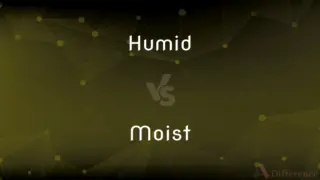Dictionary vs. Lexicon — What's the Difference?
By Urooj Arif & Maham Liaqat — Updated on April 2, 2024
A dictionary provides definitions, spellings, and pronunciations of words in a language, whereas a lexicon is a collection of words and phrases in a language, often for specific fields.
Difference Between Dictionary and Lexicon
Table of Contents
ADVERTISEMENT
Key Differences
A dictionary is a comprehensive reference that not only lists words and their meanings but also provides additional information such as word origins, synonyms, antonyms, and usage examples. It serves as a general guide to the vocabulary of a language, accessible to a wide range of users. On the other hand, a lexicon focuses on the vocabulary of a particular language or field of study, such as medicine, law, or linguistics, and may not include detailed definitions or usage guidance found in dictionaries.
While dictionaries are designed for a broad audience, including learners of a language, lexicons are often more specialized, targeting professionals or scholars within specific fields. This means that a dictionary is more likely to be used for learning new words, understanding their use in language, and correct spelling and pronunciation, whereas a lexicon is used as a reference for understanding the specific terms used in a particular discipline or industry.
Dictionaries vary in size and scope, from pocket dictionaries that cover the most commonly used words to comprehensive unabridged dictionaries that aim to catalog the entire language. Lexicons, however, are typically more focused, containing terms that are relevant to a particular subject area, and might include specialized terms that are not found in general dictionaries.
The purpose of a dictionary is to provide a general understanding and correct use of words in a language, facilitating communication and learning. Lexicons, however, serve to compile the vocabulary of a language or field, assisting in the specialized communication within that area. This distinction highlights the different roles these resources play in language and knowledge acquisition.
Comparison Chart
Definition
A reference book or electronic resource containing words of a language, their definitions, spellings, pronunciations, and additional information.
A collection of words and phrases of a language or in a particular field, often without extensive definitions.
ADVERTISEMENT
Audience
General public, including language learners and everyday users.
Professionals, scholars, or enthusiasts in specific fields.
Purpose
To provide a comprehensive understanding and usage of language.
To compile vocabulary specific to a language or field of study.
Scope
Broad, covering common and rare words across all subjects.
Focused, centered on a specific field or subject.
Usage
Learning new words, spelling, pronunciation, and understanding usage.
Reference for understanding specialized terms within a field.
Compare with Definitions
Dictionary
Covers various aspects of a language.
The dictionary covers slang and technical terms in addition to standard vocabulary.
Lexicon
Contains terms and phrases specific to a discipline.
The lexicon of computer science is constantly evolving with new technologies.
Dictionary
A resource for definitions, pronunciations, and spellings of words.
The Oxford English Dictionary is renowned for its comprehensive coverage of the English language.
Lexicon
A collection of words in a language or a specific field.
The medical lexicon includes terms like hypertension and arrhythmia.
Dictionary
Includes a wide range of information about words.
My dictionary includes etymologies and examples of usage for each entry.
Lexicon
Focuses on terms relevant to particular areas of study or interest.
Legal documents often require a lexicon to understand the specific terminology used.
Dictionary
Designed for the general public, including learners.
I bought a beginner's dictionary to help me with my English vocabulary.
Lexicon
Used for understanding the precise meaning of specialized terms.
Researchers in psychology use a lexicon to ensure accurate use of technical terms.
Dictionary
Assists in learning and using a language correctly.
The teacher recommended a dictionary to improve our spelling and vocabulary.
Lexicon
Aimed at specialists or enthusiasts in particular fields.
Linguists often refer to a language's lexicon when studying its structure and vocabulary.
Dictionary
A dictionary is a listing of lexemes from the lexicon of one or more specific languages, often arranged alphabetically (or by radical and stroke for ideographic languages), which may include information on definitions, usage, etymologies, pronunciations, translation, etc.. It is a lexicographical reference that shows inter-relationships among the data.A broad distinction is made between general and specialized dictionaries.
Lexicon
A lexicon is the vocabulary of a language or branch of knowledge (such as nautical or medical). In linguistics, a lexicon is a language's inventory of lexemes.
Dictionary
A book or electronic resource that lists the words of a language (typically in alphabetical order) and gives their meaning, or gives the equivalent words in a different language, often also providing information about pronunciation, origin, and usage
I'll look up 'love' in the dictionary
The dictionary definition of ‘smile’
The website gives access to an online dictionary
Lexicon
A dictionary.
Dictionary
A reference work containing an alphabetical list of words, with information given for each word, usually including meaning, pronunciation, and etymology.
Lexicon
A stock of terms used in a particular profession, subject, or style; a vocabulary
The lexicon of surrealist art.
Dictionary
A reference work containing an alphabetical list of words in one language with their translations in another language.
Lexicon
The vocabulary of an individual person
“A few of the women tittered, whether in response to the fluctuating octaves of my voice or the awkwardness of my lexicon” (Elisabeth Brink).
Dictionary
A reference work containing an alphabetical list of words in a particular category or subject with specialized information about them
A medical dictionary.
Lexicon
(Linguistics) The morphemes of a language considered as a group.
Dictionary
A list of words stored in machine-readable form for reference, as by spelling-checking software.
Lexicon
The vocabulary of a language.
Dictionary
A reference work with a list of words from one or more languages, normally ordered alphabetically, explaining each word's meanings (sense), and sometimes also containing information on its etymology, pronunciation, usage, semantic relations, and translations, as well as other data.
If you want to know the meaning of a word, look it up in the dictionary.
Lexicon
A dictionary that includes or focuses on lexemes.
Dictionary
A synchronic dictionary of a standardised language held to only contain words that are properly part of the language.
Lexicon
A dictionary of Classical Greek, Hebrew, Latin, or Aramaic.
Dictionary
(by extension) Any work that has a list of material organized alphabetically; e.g., biographical dictionary, encyclopedic dictionary.
Lexicon
(programming) The lexicology of a programming language. (Usually called lexical structure.)
Dictionary
(computing) An associative array, a data structure where each value is referenced by a particular key, analogous to words and definitions in a dictionary (sense 1).
Hash table
Lexicon
(rare) Any dictionary.
Dictionary
(transitive) To look up in a dictionary.
Lexicon
The vocabulary used by or known to an individual. (Also called lexical knowledge.)
Dictionary
(transitive) To add to a dictionary.
Lexicon
A set of vocabulary specific to a certain subject.
The baseball lexicon
Dictionary
To compile a dictionary.
Lexicon
A list thereof.
A baseball lexicon
Dictionary
A book containing the words of a language, arranged alphabetically, with explanations of their meanings; a lexicon; a vocabulary; a wordbook.
I applied myself to the perusal of our writers; and noting whatever might be of use to ascertain or illustrate any word or phrase, accumulated in time the materials of a dictionary.
Lexicon
A vocabulary, or book containing an alphabetical arrangement of the words in a language or of a considerable number of them, with the definition of each; a dictionary; especially, a dictionary of the Greek, Hebrew, or Latin language.
Dictionary
Hence, a book containing the words belonging to any system or province of knowledge, arranged alphabetically; as, a dictionary of medicine or of botany; a biographical dictionary.
Lexicon
A language user's knowledge of words
Dictionary
A reference book containing an alphabetical list of words with information about them
Lexicon
A reference book containing an alphabetical list of words with information about them
Common Curiosities
What is a lexicon?
A lexicon is a collection of words and phrases of a particular language or specific to a field of study, often without extensive definitions.
How does a dictionary differ from a lexicon?
A dictionary offers comprehensive details about words for a general audience, whereas a lexicon focuses on the vocabulary specific to a field or language without detailed definitions.
Who uses a lexicon?
Lexicons are typically used by professionals, scholars, and enthusiasts within specific fields for understanding specialized terms.
Can a dictionary include a lexicon?
Yes, some dictionaries include lexicons of specific fields as part of their entries, offering specialized vocabulary along with general language words.
Why would someone use a dictionary over a lexicon?
Someone might use a dictionary over a lexicon for learning and understanding the broader usage, pronunciation, and spelling of words in a language.
Are lexicons available for all fields?
Most established fields, especially academic and professional ones, have lexicons that compile their specialized vocabulary.
Can a non-specialist benefit from using a lexicon?
Non-specialists can benefit from using a lexicon when they need to understand the terminology of a specific field, such as reading a scientific paper or technical manual.
Is there a difference in the size between dictionaries and lexicons?
Yes, dictionaries tend to be larger, covering a broader range of words and information, while lexicons are more focused and concise.
How often are dictionaries and lexicons updated?
The frequency of updates depends on the publication or platform, but both are regularly updated to reflect changes in language and fields of study.
What is a dictionary?
A dictionary is a resource that lists the words of a language and provides their definitions, pronunciations, and other relevant information.
Is a lexicon always about technical terms?
While often associated with technical or specialized fields, a lexicon can also refer to the complete vocabulary of a language, including everyday words.
Do digital platforms offer both dictionaries and lexicons?
Yes, digital platforms often offer both, with dictionaries for general language learning and lexicons for specialized fields accessible online or through apps.
How do dictionaries and lexicons assist language learning?
Dictionaries assist in understanding the general use of words, including grammar and pronunciation, while lexicons help grasp specialized terminology in specific fields.
Share Your Discovery

Previous Comparison
Humid vs. Moist
Next Comparison
Pollywog vs. TadpoleAuthor Spotlight
Written by
Urooj ArifUrooj is a skilled content writer at Ask Difference, known for her exceptional ability to simplify complex topics into engaging and informative content. With a passion for research and a flair for clear, concise writing, she consistently delivers articles that resonate with our diverse audience.
Co-written by
Maham Liaqat













































